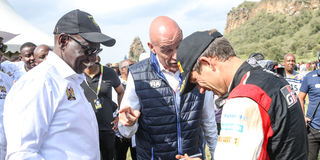Safari Rally holds a special place in Kenya’s history

Toyota’s 2023 Safari Rally winner Sebastian Ogier autographs his competition helmet before presenting in to President William Ruto as WRC Promoter CEO Jona Siebel (centre) looks on at Hell’s Gate. This year’s rally was another success.
What you need to know:
- As Kenya celebrated the 60th independence anniversary at Uhuru Gardens, the Safari Rally turned 70 this year, reminding everybody of the special place it occupies in our nation’s history, especially in 1963.
A reflection of the Jamhuri Day celebrations is the WRC Safari Rally this year turned into a state function when President William Ruto defied protocol to ride in a rally car as a sign of his government’s commitment towards the Safari Rally, and Cabinet Secretary Ababu Namwamba rallying together all stakeholders to host a successful event that forms part of the heritage celebrations this year.
As Kenya celebrated the 60th independence anniversary at Uhuru Gardens, the Safari Rally turned 70 this year, reminding everybody of the special place it occupies in our nation’s history, especially in 1963.
The 1963 East African Safari Rally was significant in many ways, coming only 45 days before the Madaraka Day self-rule celebrations and attracting over 100 foreign journalists for the 10th edition following more interest from foreign drivers, determined to conquer the Safari, which had until then not been won by any foreign driver.
The 1963 edition brought with its good reputation for Kenya after only seven drivers, who became known as the ‘Unsinkable Seven”, finished the 5,000-kilometre marathon through East Africa and indirectly helped market the event worldwide, creating its long-standing motto as “the toughest rally in the world”, a reputation which survives 60 years on.
This news, combined with impending independence from Britain, helped promote the country as the preferred tourism destination where modern cars fought for space with wild animals, pictures that would later help build Brand Kenya to the rest of the world.
Except for the regional football tournament and one-off international friendlies in football, the East African Safari Rally was the reference point and most visible brand from Kenya away from tourism, trophy and wild game hunting.
The Safari was inaugurated in 1953 as the Coronation Rally.
Kenya was a British Colony, and races (people) lived under apartheid (separation). The white settlers of European Caucasian descent segregated the indigenous Africans and immigrant South Asians and Arabs. Communities lived under unequal social, economic and political set ups; and in sports, too.
For example, it was only in association football that Africans played against or with European settlers. Interestingly, one of the leading sports highlights in the Colony – in which Africans were excluded - was the big annual European Settlers v Asians cricket tie.
White and Black people had separate football teams, occasionally mixing in a Colonial Kenya X1 for the Gossage Cup (started in 1924 and the forerunner of the present-day Council of East and Central Africa Football Associations Challenge Cup), or when a visiting team from Britain or South Africa made an incoming tour. Of course, rugby was the preserve of whites.
Eric Cecil, regarded as the father of the Safari Rally, in a 1979 interview, gave us a glimpse into how the races lived and took part in their sport:
“Happily, our sport (rallying, especially the Safari) was the first in colonial Kenya and East Africa to embrace racial harmony. I mean, you were out there in the wild, and you needed every brother… So, in the Safari it was all about minding each other’s back; hence you didn’t care what colour your mechanic, crew or even the ordinary folk who pushed your car out of a bog."
It was refreshing and pleasing to see the Sports Ministry rating the WRC Safari as one of its flagship success stories this yea. Inviting the Rally Star programme drivers and young aspiring ones to the Nairobi International Trade Fair gave Kenyans, young and old, a chance to interact and share a passion which defies age or status.
The national celebrations also usher in the 2024 WRC Safari Rally, pushed forward to fit in the traditional Easter date for the first time since 1996 (the 2010 edition was also held on the Easter weekend).
The government is negotiating with the World Rally Championship commercial rights holder, the WRC Promoter, to extend the current Promoter Agreement until 2029.




